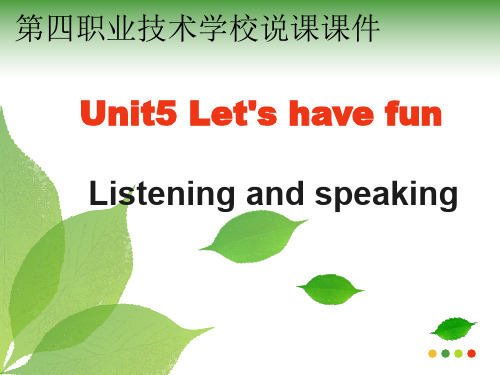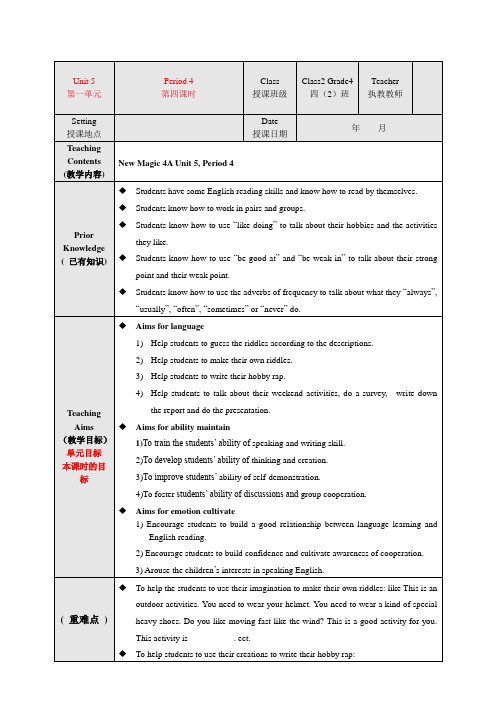新技能英语 基础教程1教学设计Unit 5 Let’s have fun!
- 格式:doc
- 大小:154.00 KB
- 文档页数:14

Unit 1 Lesson 5 Having Fun Together(教案)I. Introduction(介绍):本节课是第五课,题目为“一起玩乐”。
目的是让孩子们了解到更多的娱乐活动方式,以及学习如何用英语表达自己的喜欢和不喜欢。
同时,我们也会介绍一些新的单词和短语。
II. Learning Objectives(学习目标):1.能够学会表达自己的爱好和不喜欢。
2.能够能较熟练地运用课上学到的单词和短语。
3.能够理解并使用重点语句。
III. Key Vocabulary(重点词汇):•skating(滑冰)•swimming(游泳)•dancing(跳舞)•playing computer games(玩电脑游戏)•like(喜欢)•love(热爱)•hate(讨厌)•enjoy(享受)IV. Teaching Procedure(教学步骤):Step 1. Warm-up(热身活动)(5mins):1.教师可以播放一段有关玩乐的视频让孩子们跟着视频中的人一起做些有趣的玩乐动作。
2.教师可以问孩子们他们平常喜欢做什么样的娱乐活动?Step 2. Lead-in(导入)(10mins):1.教师出示一张图片,让孩子们讲解这张图片中人物在做什么活动?有哪些活动是他们自己喜欢、不喜欢的呢?2.教师提供一些词汇帮助孩子们描述这张图片是关于玩乐的。
Step 3. Presentation(呈现)(20mins):1.教师介绍新的单词和短语,让孩子跟着老师朗读,加深记忆。
2.教师出示一个活动图片或视频,让孩子们跟着读英文展示所爱的活动,再请他们找到自己喜欢的活动。
Step 4. Practice(练习)(15mins):1.教师提供一份练习题,在一些图片或短文中插入一些空格,把所缺的单词补充完整。
2.教师和孩子们一起朗读已填完整的短文或图片说明。
Step 5. Production(表现)(10mins):1.教师提供一个活动场景,让学生根据自己的爱好和不喜欢,运用所学词汇和句子将此活动场景展示出来。

《英语1》(基础模块高教版)Unit 5 what,s your hobby?(第三课时教学设计)一.教材分析1.教学内容本课时系教材《英语1》(基础模块高教版)第五单元的第三课时,是阅读和写作课。
本课在整个单元中扮演着承前启后的角色, 既是对上节听说课的复习和巩固,又为本单元的任务-建立班级兴趣小组做好准备。
阅读部分是关于人们的兴趣爱好的短小文章,并分别以第一人称和第三人称叙述形式出现。
写作部分是让学牛写出同学的好恶。
所以这课目的在于通过阅读课文和写作训练让学生进一步掌握关于兴趣爱好的表达方式。
2.教学重点、难点(1)教学重点①指导学生完成阅读任务②指导学生掌握以第一人称和第三人称表达自己和他人的兴趣爱好。
(2)教学难点①学生能将兴趣爱好第一人称的叙述方式以第三人称进行复述。
②学生能够结合生活实际写出同学的好恶。
3.教学工具:PPT,卡片,乒乓球,书4.教学方法:情景教学法,演示法,师生互动法,小组合作法二、教学目标1.知识目标(1)学生能掌握和运用表达兴趣爱好的词汇和短语,如hate, favorite,exciting, boring hate doing sth 等。
(2 )学生能理解和运用表达兴趣爱好的第一人称和第三人称的句型。
如:I enjoy playing computer games・What's his hobby?He /She likes …,but he/ she doesn't like…He/ She enjoys..., but he/ she doesn't enjoy...He/ She loves ・・・,but he/ she hates・・・2.能力目标(1)学生能够读懂关于兴趣爱好的阅读材料。
(2)学生能够简单介绍自己的个人爱好以及其他人的兴趣爱好。
3.情感目标(1)学生能够积极与他人合作,有积极的学习态度(2)尊重他人的兴趣爱好。


教学设计—Unit 5 Fun Clubs Section A How do you choose a school club?尚志市帽儿山镇中学高玉灵一、教材分析《Fun Clubs》是2024人教版初中英语七年级上册第五单元教学内容,主要是以“学校俱乐部”为主题,隶属“人与社会”范畴。
基于教材内容角度分析,涉及科学、艺术、运动等诸多学校俱乐部活动,目的是引领学生认识校园生活的丰富性、多彩性,并培养语言运用能力和跨文化交际能力。
其中,教材中涉及的重点词汇也都是与学生俱乐部密切相关。
比如,club(俱乐部)、activity(活动)、choose(选择)等等依据句型“What club do you want to join?”“I want to join the…club,because…”不仅是学生在生活中会频繁使用的英语词汇,还能在句型运用中学会表达自己的意愿,并说明理由,实现逻辑思维能力和表达能力的双重提升。
此次以该单元中的Section A How do you choose a school club?教学为例,引领在听力活动、对话活动中,学会如何根据自己的兴趣、特长和目标选择合适的俱乐部。
可见,该单元不仅仅是一个语言学习单元,还能成为激发潜能、助力学生全面发展的平台。
二、学情分析七年级学生已经拥有一定英语学习基础,能够利用一些基本英语词汇和句型进行简单交流,拥有良好自主学习能力、团队合作能力。
基于成长角度分析,七年级学生会对周围新鲜事物产生强烈好奇心,尤其是在学生生活相关的话题中,而本节课教学是以“学校俱乐部”为核心话题,不仅贴合学生实际生活,可以有效激发学生学习兴趣、产生共鸣,还能积极参与学校俱乐部讨论、了解不同俱乐部特点,进而提高参与英语学习的动力。
虽然学生已经拥有一定词汇基础,但对本次教学中涉及的学校社团词汇比较陌生,并且对社团文化特点、背景存有一知半解的状况。
因此,在教学过程中,教师应关注学生词汇掌握能力、句型理解能力,通过问题驱动、角色扮演、小组讨论等形式,将新知与旧识衔接起来,带领学生在社团正确认识各项社会活动,并在实践、学习中加深对社团文化理解。

五年级上册英语教案-Unit1 Lesson5 Having Fun Together 冀教版一、教学目标知识目标1.学生能够听、说、读、写五个动词短语:take a walk, pick apples, fly kites, have a picnic, go swimming。
2.学生能够理解和运用五个动词短语进行交流。
能力目标1.学生能够熟练听懂、理解和运用简单的英语口语表达。
2.学生能够在生活中运用所学英语知识,丰富自己的生活经验。
情感目标1.培养学生团队合作精神,让学生找到在集体中真正属于自己的位置。
2.通过练习,培养学生积极参与的意愿和勇气。
二、教学重难点教学重点1.学生能够说出五个动词短语:take a walk, pick apples, fly kites, have a picnic, go swimming。
2.学生能够正确理解并运用这五个动词短语进行交流。
教学难点1.学生在理解和运用语言上存在一定的难度。
2.学生在口语表达上存在一定的困难,需要进行多次模仿和练习。
三、教学过程A. Warming-up通过以下问题引导学生进行对话。
1.What do you like to do on the weekend?2.Do you like to take a walk with your family?3.Do you like to pick apples with your friends?4.Do you like to fly kites?5.Do you like to have a picnic in the park?6.Do you like to go swimming in the river or the pool?B. Presentation1.呈现五个动词短语:take a walk, pick apples, fly kites, have a picnic, go swimming.2.引导学生跟随老师朗读短语,并解释其含义。

教案课程名称新生代英语基础教程1 课时班级专业教师系部教研室教材《新生代英语基础教程1》补充教学资源VOCABULARY BUILDER➢参考译文SHOW TIME➢语言解析1. You’ll get used to it pretty soon. 你很快会习惯这儿的。
get used to习惯,适应e.g. I have got used to working on challenging tasks.我已经习惯做有挑战性的工作了。
2. We take the Number 3 to Glendale Community College. 我们坐3路车到格兰岱尔社区大学。
1) community college社区大学e.g. My mum went to a community college to learn ikebana after her retirement.我妈妈退休后,去社区大学学习插花。
2) take the No…乘……路车(公交车)e.g. You can take the No. 6 to the amusement park.你可以乘6路车去游乐园。
3. First we take the Number 11, get off at the Galleria Mall…首先,我们乘11路公交车,在加乐利亚购物中心下车……get off 下车e.g. The bus driver got the passengers off in time.公共汽车司机让乘客及时下了车。
4. What a coincidence! 真巧啊!coincidence 一致;巧合e.g. By coincidence, his wife is one of my classmates in college.巧合的是,他的妻子是我的大学同学。
It was no coincidence that his car was seen near the bank at the time of the robbery.劫案发生时有人看见他的车停在银行附近,这绝非巧合。